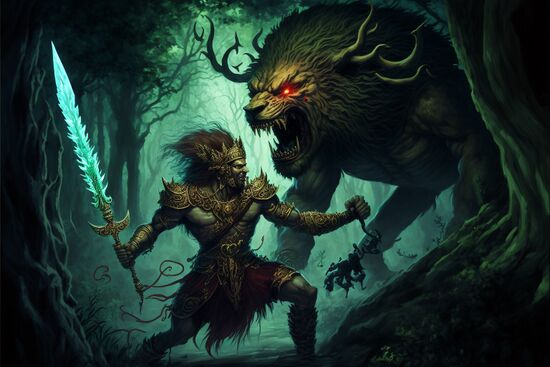The Epic of Gilgamesh/Themes: Difference between revisions
(→The Transformative Power of Friendship: Added link.) |
m (→Civilization v. Nature: Added text.) |
||
| Line 29: | Line 29: | ||
The epic raises questions about the balance between human needs and the preservation of the natural world. It highlights the significance of nature, the consequences of human actions, and the need to find harmony between human endeavors and the preservation of the environment. For example, Humbaba’s cedar forest represents a pristine natural habitat, abundant with valuable resources. Gilgamesh and Enkidu's quest to conquer the forest can be interpreted as an exploration of humanity’s relationship with nature and the desire to harness its resources for the betterment of civilization. This raises questions about the balance between human needs and the preservation of the natural world. | The epic raises questions about the balance between human needs and the preservation of the natural world. It highlights the significance of nature, the consequences of human actions, and the need to find harmony between human endeavors and the preservation of the environment. For example, Humbaba’s cedar forest represents a pristine natural habitat, abundant with valuable resources. Gilgamesh and Enkidu's quest to conquer the forest can be interpreted as an exploration of humanity’s relationship with nature and the desire to harness its resources for the betterment of civilization. This raises questions about the balance between human needs and the preservation of the natural world. | ||
* “[[August 26, 2004|Ecological Themes in ''Gilgamesh'']]” | * See also: “[[August 26, 2004|Ecological Themes in ''Gilgamesh'']]” | ||
{{Epic}} | {{Epic}} | ||
[[Category:Gilgamesh]] | [[Category:Gilgamesh]] | ||
Revision as of 10:04, 13 May 2023
Themes of Gilgamesh: Exploring the Profound Insights of an Ancient Epic
Gilgamesh explores various themes that resonate with across time and cultures—some of which feel particularly contemporary. A close reading and analysis will uncover layers of wisdom, contemplation, and existential reflections. The following are major thematic concerns of the epic.
The Quest for Meaning and Purpose
One of the central themes of Gilgamesh revolves around the human quest for meaning and purpose in life. Gilgamesh, driven by his thirst for immortality and eternal fame, embarks on a journey that ultimately leads him to confront the inevitability of mortality. Through his experiences and trials, the epic challenges readers to reflect on the significance of their own existence and the pursuit of a purposeful life.
The Fragility of Human Existence
Gilgamesh confronts the fragility and transience of human existence, emphasizing the ephemeral nature of life. The epic illustrates the brevity of mortal achievements, highlighting the inevitability of aging, decay, and death. This theme prompts contemplation on the impermanence of human endeavors and the importance of cherishing and making the most of the limited time we have.
The Limitations of Power and Mortality
Gilgamesh, a powerful king, grapples with the limitations of his own mortality and the boundaries of his power. Through his encounters with gods, monsters, and natural forces, the epic explores the inherent vulnerabilities of humanity and the realization that even the mightiest rulers are subject to the whims of fate. This theme invites reflection on the balance between ambition and humility and the acceptance of our place within the grand tapestry of existence.
The Transformative Power of Friendship
Friendship emerges as a transformative and redemptive force in Gilgamesh. The deep bond between Gilgamesh and Enkidu serves as a catalyst for personal growth, moral awakening, and the exploration of empathy and compassion. Their friendship challenges Gilgamesh’s hubris, softens his heart, and offers him solace in times of grief. This theme celebrates the power of human connection and highlights the importance of authentic human relationships.
- See also: “Friendship and Two Epics”
The Pursuit of Wisdom and Self-Realization
Gilgamesh’s journey is also a quest for wisdom and self-realization. Through his encounters with various characters and his confrontation with mortality, he gains profound insights into the nature of life, death, and the human condition. The epic prompts readers to reflect on their own pursuit of knowledge, self-discovery, and the quest for wisdom that enriches and expands the boundaries of our understanding.
The Legacy and Transience of Fame
Gilgamesh explores the ephemeral nature of fame and the enduring legacy of human achievements. The epic contemplates the transient nature of personal glory and the pursuit of immortality through the enduring impact of one's actions, contributions, and the stories that outlive the individual. This theme invites introspection on the pursuit of lasting legacies and the ways in which our actions shape the world beyond our own existence.
Civilization v. Nature
The epic raises questions about the balance between human needs and the preservation of the natural world. It highlights the significance of nature, the consequences of human actions, and the need to find harmony between human endeavors and the preservation of the environment. For example, Humbaba’s cedar forest represents a pristine natural habitat, abundant with valuable resources. Gilgamesh and Enkidu's quest to conquer the forest can be interpreted as an exploration of humanity’s relationship with nature and the desire to harness its resources for the betterment of civilization. This raises questions about the balance between human needs and the preservation of the natural world.
- See also: “Ecological Themes in Gilgamesh”
